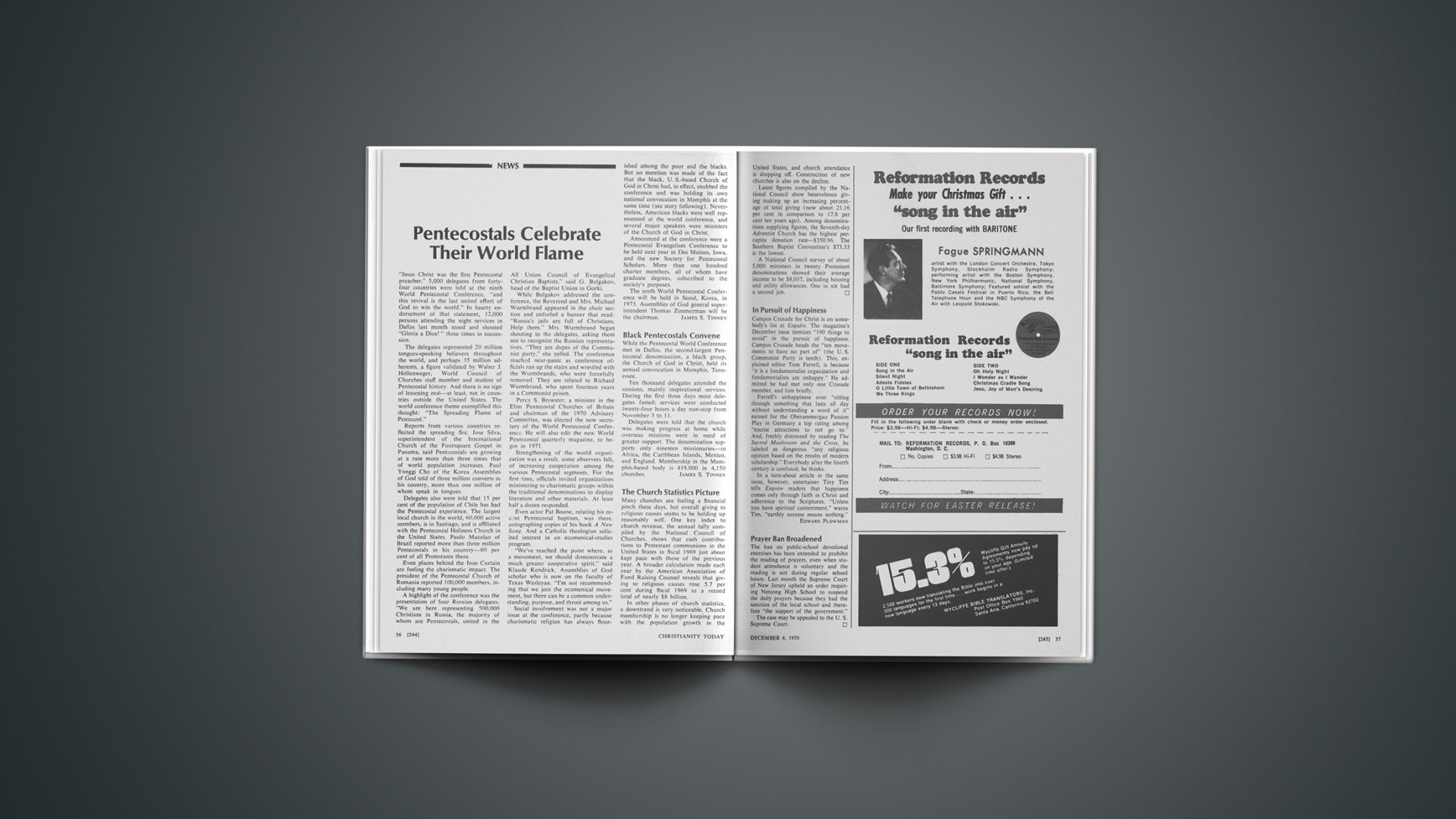“Jesus Christ was the first Pentecostal preacher,” 5,000 delegates from forty-four countries were told at the ninth World Pentecostal Conference, “and this revival is the last united effort of God to win the world.” In hearty endorsement of that statement, 12,000 persons attending the night services in Dallas last month stood and shouted “Gloria a Dios!” three times in succession.
The delegates represented 20 million tongues-speaking believers throughout the world, and perhaps 35 million adherents, a figure validated by Walter J. Hollenweger, World Council of Churches staff member and student of Pentecostal history. And there is no sign of lessening zeal—at least, not in countries outside the United States. The world conference theme exemplified this thought: “The Spreading Flame of Pentecost.”
Reports from various countries reflected the spreading fire. Jose Silva, superintendent of the International Church of the Foursquare Gospel in Panama, said Pentecostals are growing at a rate more than three times that of world population increases. Paul Yonggi Cho of the Korea Assemblies of God told of three million converts in his country, more than one million of whom speak in tongues.
Delegates also were told that 15 per cent of the population of Chile has had the Pentecostal experience. The largest local church in the world, 60,000 active members, is in Santiago, and is affiliated with the Pentecostal Holiness Church in the United States. Paulo Macalao of Brazil reported more than three million Pentecostals in his country—80 per cent of all Protestants there.
Even places behind the Iron Curtain are feeling the charismatic impact. The president of the Pentecostal Church of Rumania reported 100,000 members, including many young people.
A highlight of the conference was the presentation of four Russian delegates. “We are here representing 500,000 Christians in Russia, the majority of whom are Pentecostals, united in the All Union Council of Evangelical Christian Baptists,” said G. Bulgakov, head of the Baptist Union in Gorki.
While Bulgakov addressed the conference, the Reverend and Mrs. Michael Wurmbrand appeared in the choir section and unfurled a banner that read: “Russia’s jails are full of Christians. Help them.” Mrs. Wurmbrand began shouting to the delegates, asking them not to recognize the Russian representatives. “They are dupes of the Communist party,” she yelled. The conference reached near-panic as conference officials ran up the stairs and wrestled with the Wurmbrands, who were forcefully removed. They are related to Richard Wurmbrand, who spent fourteen years in a Communist prison.
Percy S. Brewster, a minister in the Elim Pentecostal Churches of Britain and chairman of the 1970 Advisory Committee, was elected the new secretary of the World Pentecostal Conference. He will also edit the new World Pentecostal quarterly magazine, to begin in 1971.
Strengthening of the world organization was a result, some observers felt, of increasing cooperation among the various Pentecostal segments. For the first time, officials invited organizations ministering to charismatic groups within the traditional denominations to display literature and other materials. At least half a dozen responded.
Even actor Pat Boone, relating his recent Pentecostal baptism, was there, autographing copies of his book A New Song. And a Catholic theologian solicited interest in an ecumenical-studies program.
“We’ve reached the point where, as a movement, we should demonstrate a much greater cooperative spirit,” said Klaude Kendrick, Assemblies of God scholar who is now on the faculty of Texas Wesleyan. “I’m not recommending that we join the ecumenical movement, but there can be a common understanding, purpose, and thrust among us.”
Social involvement was not a major issue at the conference, partly because charismatic religion has always flourished among the poor and the blacks. But no mention was made of the fact that the black, U. S.-based Church of God in Christ had, in effect, snubbed the conference and was holding its own national convocation in Memphis at the same time (see story following). Nevertheless, American blacks were well represented at the world conference, and several major speakers were ministers of the Church of God in Christ.
Announced at the conference were a Pentecostal Evangelism Conference to be held next year in Des Moines, Iowa, and the new Society for Pentecostal Scholars. More than one hundred charter members, all of whom have graduate degrees, subscribed to the society’s purposes.
The tenth World Pentecostal Conference will be held in Seoul, Korea, in 1973. Assemblies of God general superintendent Thomas Zimmerman will be the chairman.
Black Pentecostals Convene
While the Pentecostal World Conference met in Dallas, the second-largest Pentecostal denomination, a black group, the Church of God in Christ, held its annual convocation in Memphis, Tennessee.
Ten thousand delegates attended the sessions, mainly inspirational services. During the first three days most delegates fasted; services were conducted twenty-four hours a day non-stop from November 3 to 11.
Delegates were told that the church was making progress at home while overseas missions were in need of greater support. The denomination supports only nineteen missionaries—in Africa, the Caribbean Islands, Mexico, and England. Membership in the Memphis-based body is 419,000 in 4,150 churches.
JAMES S. TINNEY
The Church Statistics Picture
Many churches are feeling a financial pinch these days, but overall giving to religious causes seems to be holding up reasonably well. One key index to church revenue, the annual tally compiled by the National Council of Churches, shows that cash contributions to Protestant communions in the United States in fiscal 1969 just about kept pace with those of the previous year. A broader calculation made each year by the American Association of Fund Raising Counsel reveals that giving to religious causes rose 5.7 per cent during fiscal 1969 to a record total of nearly $8 billion.
In other phases of church statistics, a downtrend is very noticeable. Church membership is no longer keeping pace with the population growth in the United States, and church attendance is dropping off. Construction of new churches is also on the decline.
Latest figures compiled by the National Council show benevolence giving making up an increasing percentage of total giving (now about 21.16 per cent in comparison to 17.8 per cent ten years ago). Among denominations supplying figures, the Seventh-day Adventist Church has the highest per-capita donation rate—$350.96. The Southern Baptist Convention’s $73.33 is the lowest.
A National Council survey of about 5,000 ministers in twenty Protestant denominations showed their average income to be $8,037, including housing and utility allowances. One in six had a second job.
In Pursuit Of Happiness
Campus Crusade for Christ is on somebody’s list at Esquire. The magazine’s December issue itemizes “190 things to avoid” in the pursuit of happiness. Campus Crusade heads the “ten movements to have no part of” (the U. S. Communist Party is tenth). This, explained editor Tom Ferrell, is because “it is a fundamentalist organization and fundamentalists are unhappy.” He admitted he had met only one Crusade member, and him briefly.
Ferrell’s unhappiness over “sitting through something that lasts all day without understanding a word of it” earned for the Oberammergau Passion Play in Germany a top rating among “tourist attractions to not go to.” And, freshly distressed by reading The Sacred Mushroom and the Cross, he labeled as dangerous “any religious opinion based on the results of modern scholarship.” Everybody after the fourth century is confused, he thinks.
In a turn-about article in the same issue, however, entertainer Tiny Tim tells Esquire readers that happiness comes only through faith in Christ and adherence to the Scriptures. “Unless you have spiritual contentment,” warns Tim, “earthly success means nothing.”
EDWARD PLOWMAN
Prayer Ban Broadened
The ban on public-school devotional exercises has been extended to prohibit the reading of prayers, even when student attendance is voluntary and the reading is not during regular school hours. Last month the Supreme Court of New Jersey upheld an order requiring Netcong High School to suspend the daily prayers because they had the sanction of the local school and therefore “the support of the government.”
The case may be appealed to the U. S. Supreme Court.
Anglicans Get New Synod
In its most radical change since Henry VIII rejected papal supremacy, the Church of England got a new form of government when Queen Elizabeth inaugurated the General Synod in Westminster Abbey last month. Intended to give greater responsibility to the laity, the 537-strong body comprises the diocesan bishops and elected representatives, both clerical and lay (among the latter there are more than fifty women).
“A truer style of Christian association than we had had before,” said Dr. Eric Abbott, dean of Westminster. In a remarkably refreshing sermon he warned that the synod “must not be the Church Assembly all over again. Woe betide us if this synod does not insist that the first things of the Gospel come first.”
All the top people reappeared that afternoon in Church House for the first business session. Introduced by synod chairman Dr. Michael Ramsey, the 44-year-old Elizabeth made a kinder reference than Dean Abbott had to the former dispensation. It was, she said, “a great act of faith on the part of the Convocations … and the Church Assembly … to pool their powers so as to give the new synod … full responsibility.”
Those who had endured the morning’s marathon with all its pomp and circumstance welcomed the brevity of the speeches that followed. “We do not suffer from the delusion that a reorganization of our church government … will itself bring in the Kingdom of God,” said Donald Coggan, who as archbishop of York is the country’s second-ranking churchman. From the Kirk’s General Assembly, Moderator Hugh Douglas engagingly congratulated the Kirk’s southern sister in approximating at last to the presbyterian model. John Cardinal Heenan caused an anxious moment by saying that of course there was “only one Church,” but his reference may have been to the ecumenical movement. Greek Orthodoxy’s Athenagoras, quaintly styled archbishop of Thyatira and Great Britain (the latter term omitted by the archbishop of Canterbury in introducing him), neatly upstaged the others by being the only speaker to acknowledge the presence of Prime Minister Edward Heath.
An early topic for the synod was the question of admitting to Communion members of other churches. That morning non-Anglicans had been permitted to share in the elements, unlike the Coronation Service seventeen years ago in the same place when the archbishop of Canterbury, Lord Fisher, had pointedly excluded the moderator from the Church of Scotland, who had been a participant in the coronation ceremony.
Fisher’s successor, Ramsey, told the synod that the church had been legally advised that “only persons who are confirmed or ready and desirous of being confirmed can be admitted”—because that was what the Prayer Book said. He added that this was not the position in practice (a view with which some present disagreed). Anglo-Catholics and evangelicals then spoke their customary pieces on this perennial piece of confusion, the establishment showed its customary caginess, and all seemed relieved that they were called not to decide but merely to take soundings for future legislation.
Elected as chairman of the new synod’s House of Laity was Professor Norman Anderson, 62, a prominent evangelical who is dean of the faculty of laws at London University.
J. D. DOUGLAS
‘Superstar’: Haunting Questions
Never before have young people been so turned off by the organized, orthodox Church. Yet never before have they been so obsessed with Jesus. And they show it in their music.
In Jesus Christ Superstar, released by Decca last month, the animosity toward established religion for its alleged hypocrisy and the “Jesusmania” of this generation swing loud and long. Written by two young Britishers, composer Andrew Lloyd Webber and librettist Tim Rice, the rock opera is eighty-seven minutes of a hard, electronic examination of the Passion of Christ. Using eleven singers, three choirs, an eighty-five-piece orchestra, and a Moog Synthesizer, Webber dramatically melds the music to Rice’s words. Many Christians have ignored this generation’s questions about Jesus. For those who will listen, Superstar tells what young people are saying.
Rice and Webber rely basically on Scripture. But reflecting the twentieth century’s fascination with the anti-hero, they treat Judas sympathetically, as only a pawn of destiny. Judas sings the title song, and his questions are contemporary. Is Christ the Son of God, or is he merely a prophet-man, no greater than Buddha or Mohammed? This generation longs for the answers.
Christ’s flesh-and-blood lack of divinity is underscored by the implied relationship between Jesus and Mary Magdalene. In one blues number, she wails her fear of and desire for Jesus. “He’s a man he’s just a man” she moans, “and I’ve had so many men before.”
The scene in Gethsemane is a combination of vacillation and egocentricity. Jesus was “inspired,” but now just “tired.” He accuses God of being “far too keen on where and how and not so hot on why,” and he flaunts the kind of death he will die, even though he sees no reason for it.
Most of the melodies have few of the sinister overtones one might expect: Caiaphas, the only basso, is the exception. He is cold, calculating, pushy: he sings “this Jesus must die.”
The spirit of restlessness and yearning is enhanced by the synthesis of solo and chorus. The litany of the chorus is intermingled with the solos until the two become inseparable.
The question of Jesus’ identity is raised repeatedly in both words and music; no one seems to know who he is, but everyone seems to care. The repetitious questioning has two focal points: the scoffing, cynical words of Herod, and Judas’s words in the title song, “Superstar.” Herod, in a rollicking ragtime number, calls for Christ to prove his divinity. Herod wants miracles. He offers Christ freedom if he’ll only walk across Herod’s swimming pool. Yet in Herod’s cynicism there is a need to believe Jesus’ claims. When Christ doesn’t answer, Herod cries “fraud.” But Jesus’, silence dents Herod’s callousness. The last heard of Herod in the opera is his scream: “Get out of my life!”
In “Superstar” the chorus repeatedly asks, “Who are you? What have you sacrificed?” But Christ is already on the Cross, and there is no answer. The wordless finale, entitled “John Nineteen Forty-One,” leaves Christ in the grave. No faith and no victory emerge from this weary music, but the relentless quest remains, haunting and hollow.
Here is a work that sets the standards for full-length rock—and an idiom for reaching this generation. Perhaps some Christian composer will take the cue and produce a rock opera about Christ that ends not with hollow questions but with triumphant answers.
CHERYL A. FORBES
Looking Ahead In Anger
The chairman of the committee that drafted the COCU Plan of Union is outspokenly pessimistic about its chances for approval. Dr. William A. Benfield, Jr., says, “There is strong opposition … in every participating church.” In a speech in Louisville last month, Benfield also painted a gloomy picture for his own denomination, the Presbyterian Church in the U. S. He said that “a split is inevitable. There is no hope of reconciliation.”
Benfield, a theological liberal who is currently moderator of the Southern Presbyterian General Assembly, charged angrily that organized groups of theologically conservative clergy and laymen are “tearing our church apart.”










